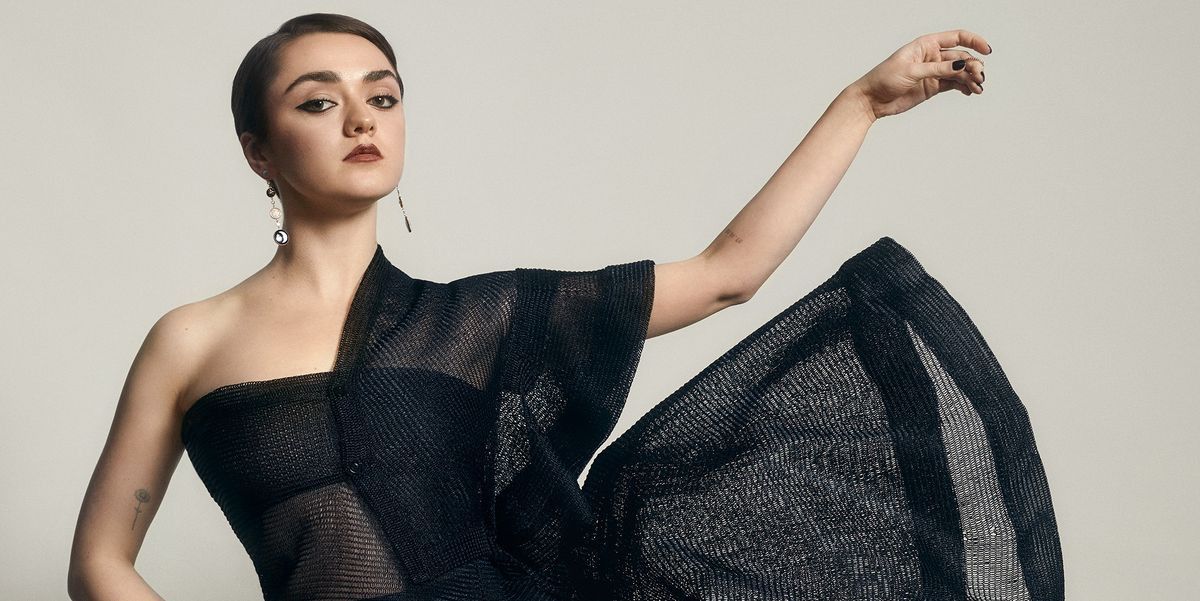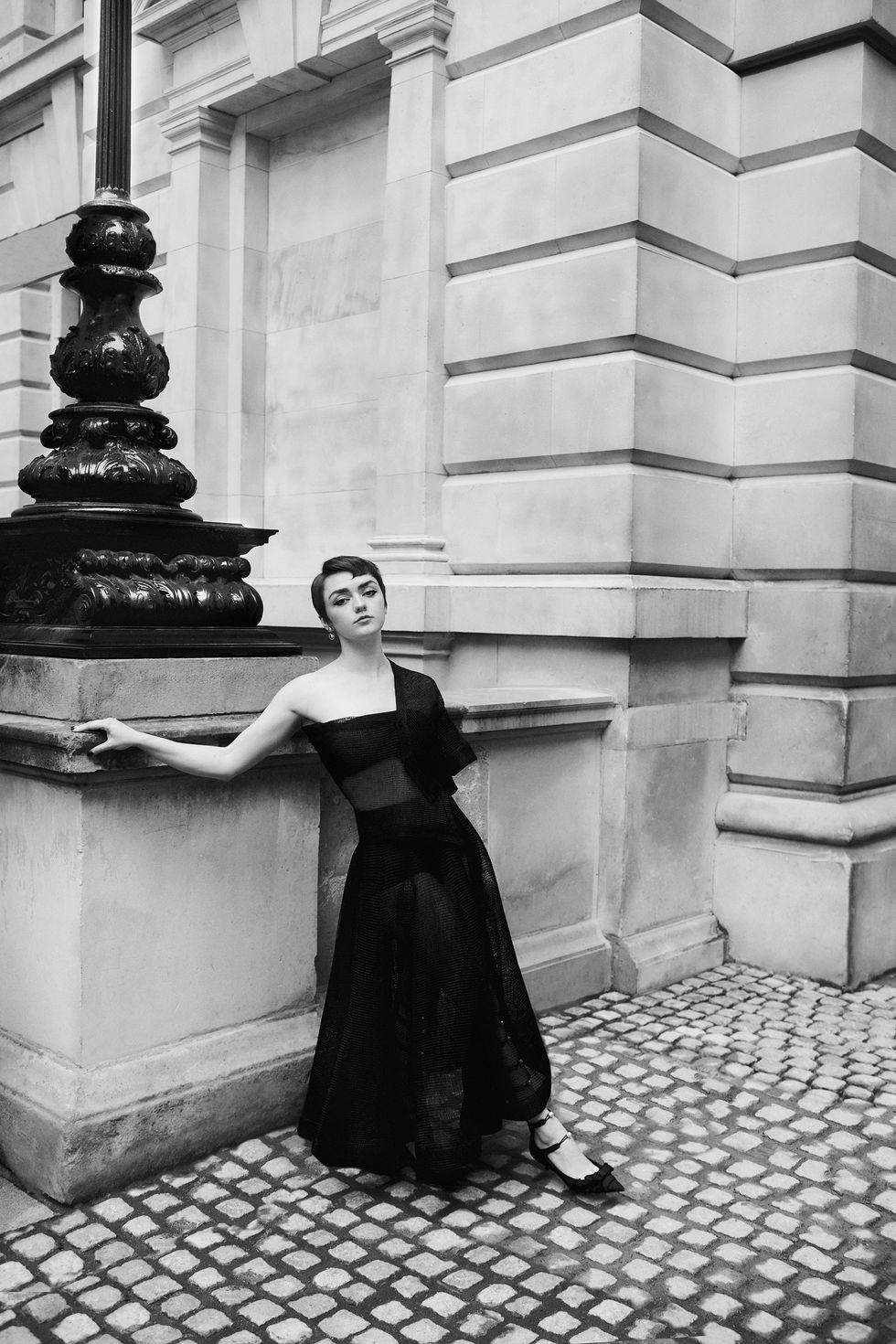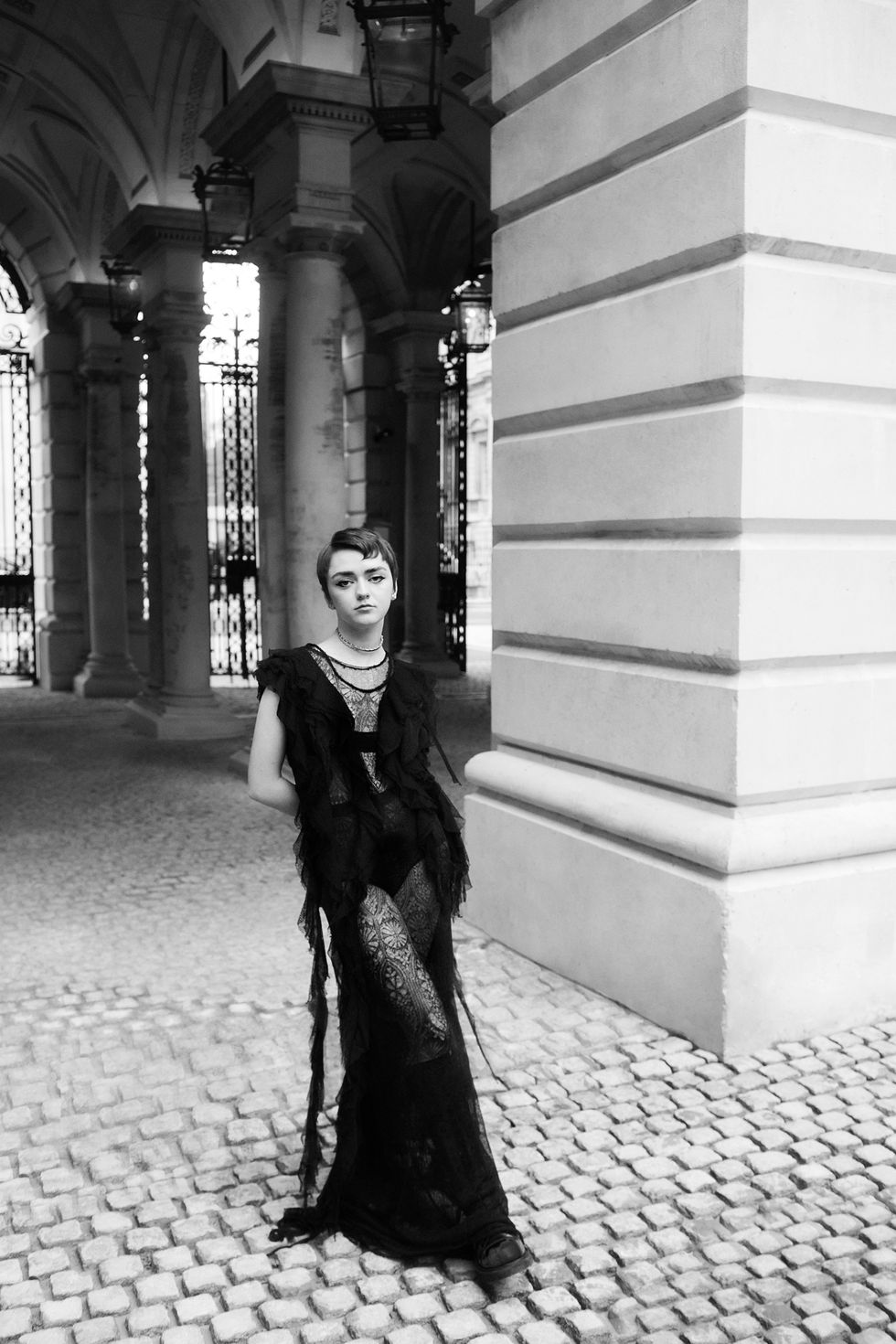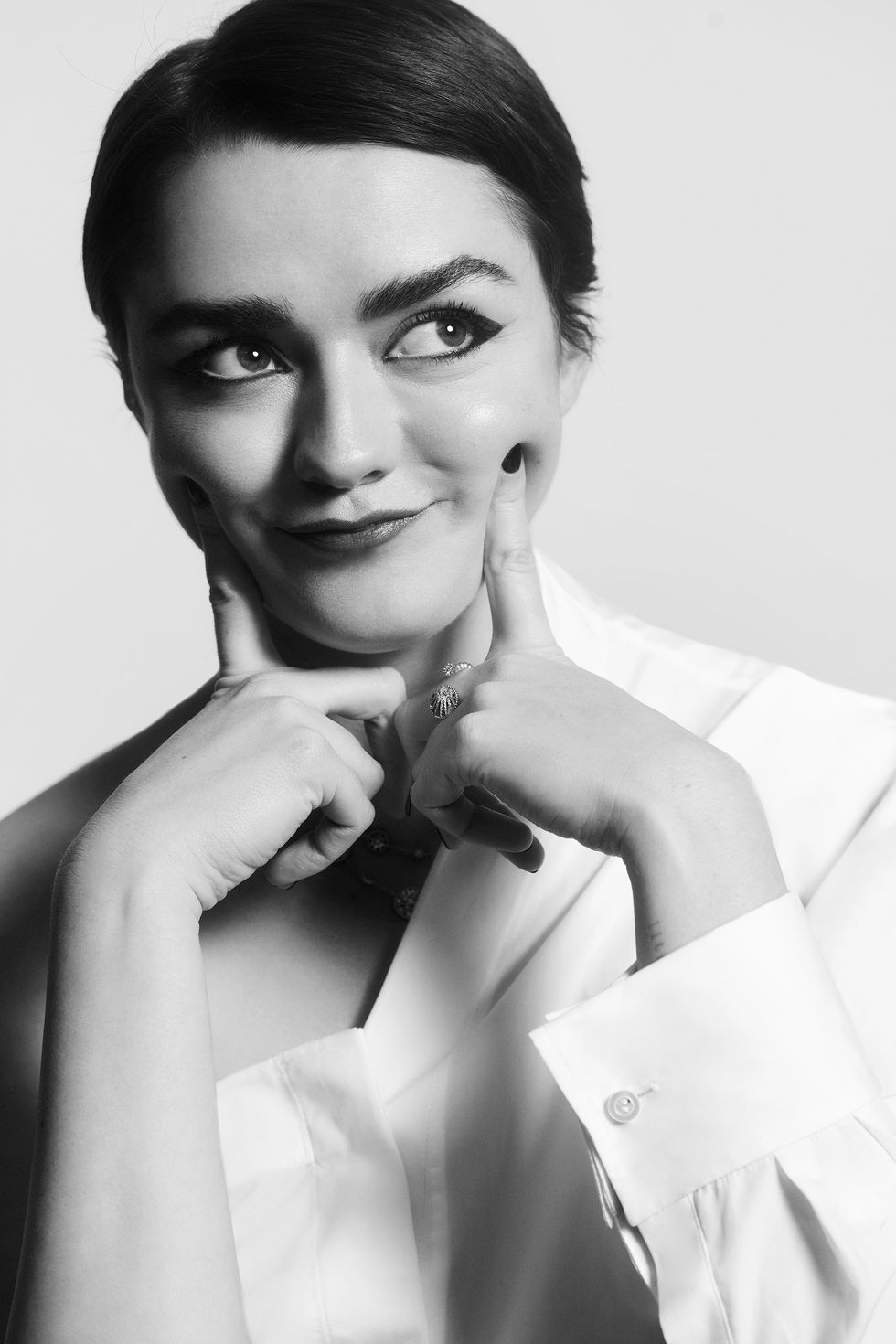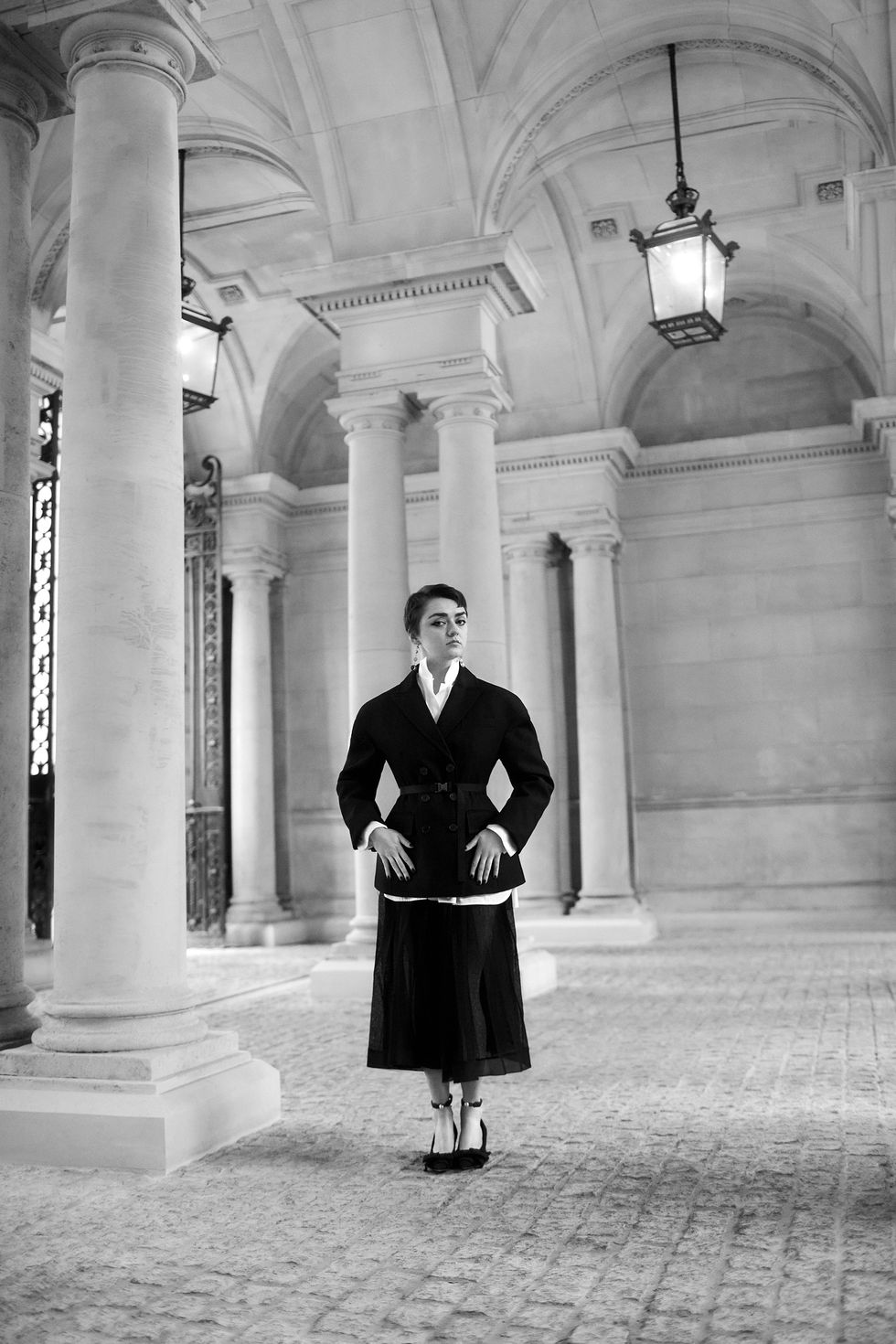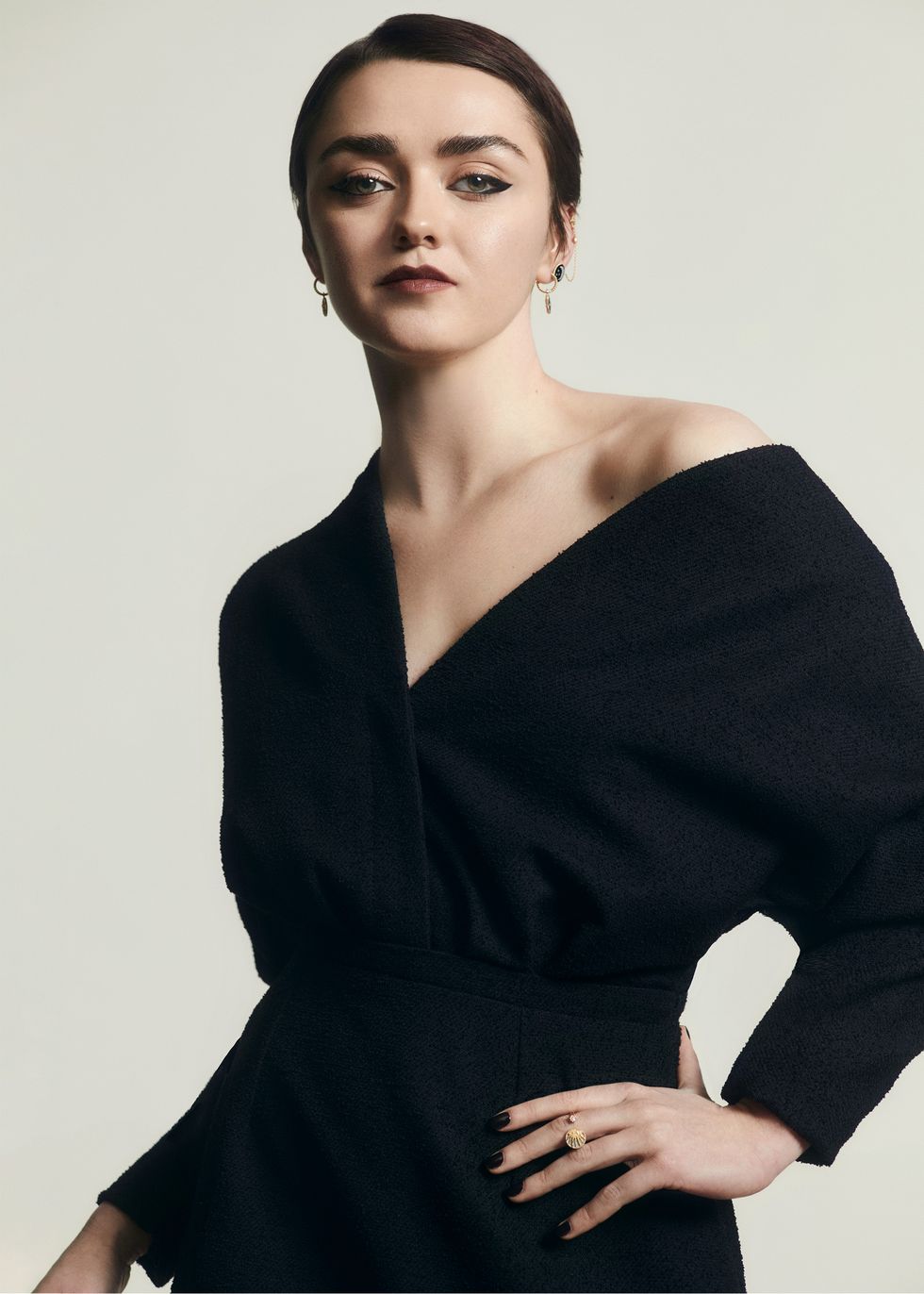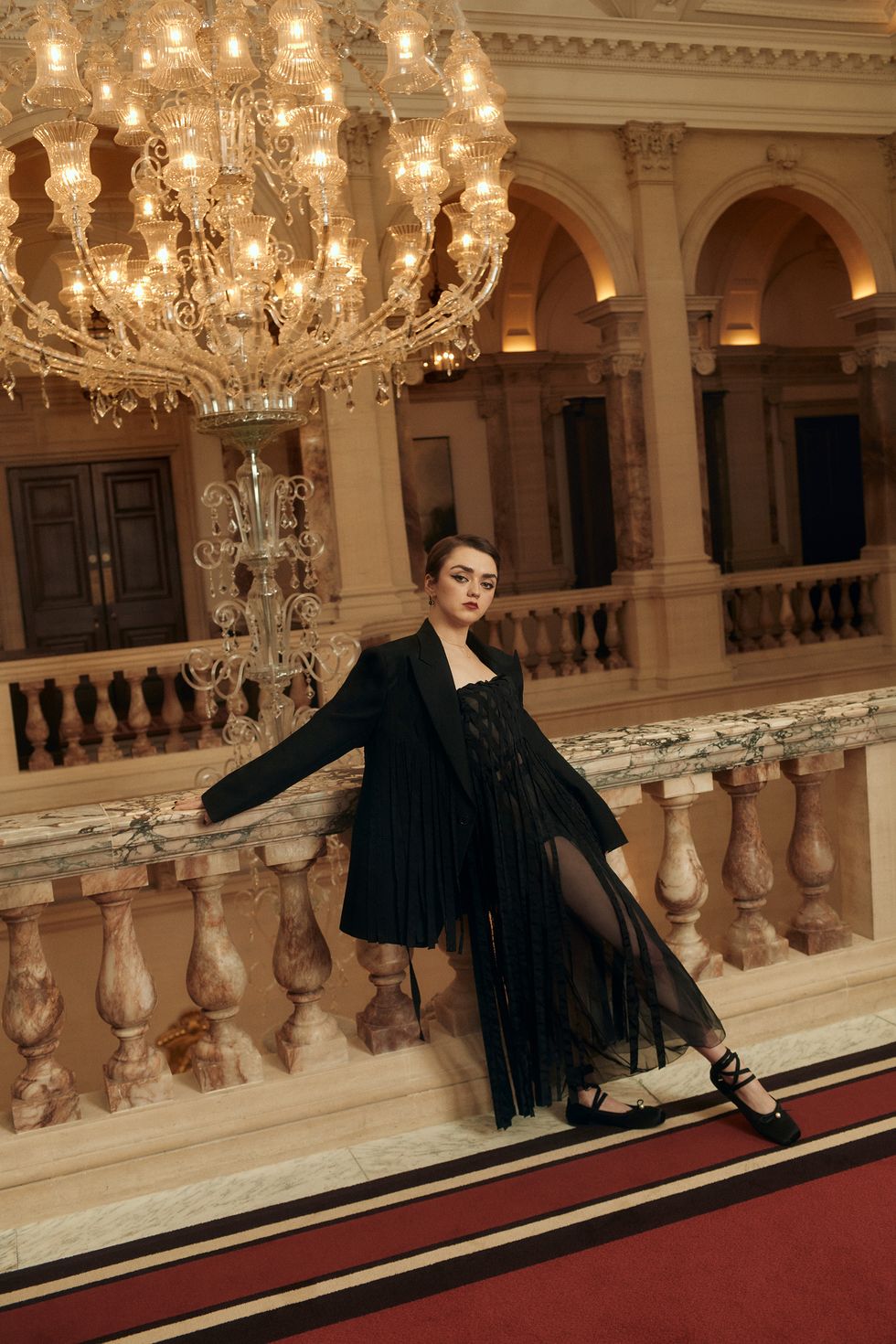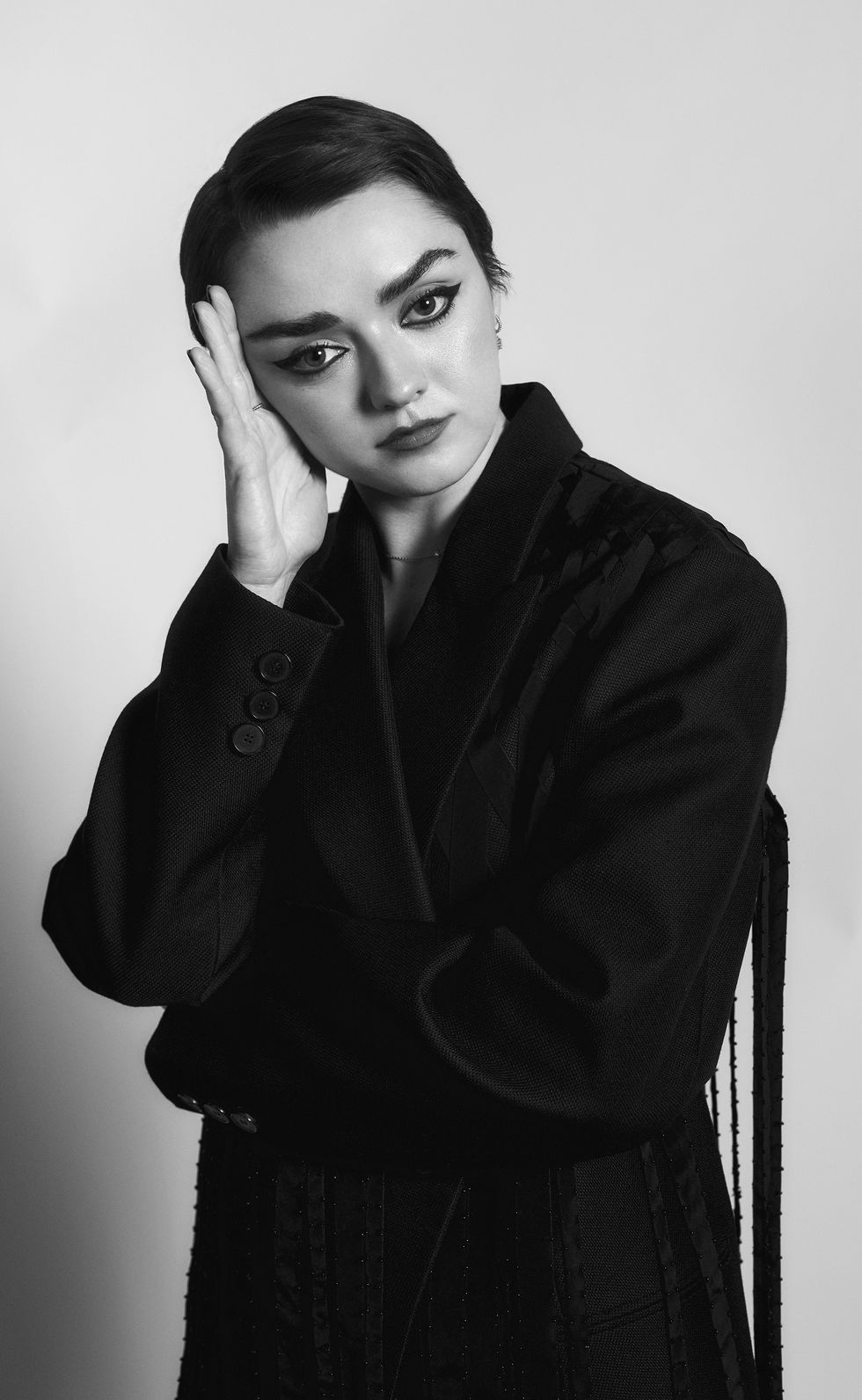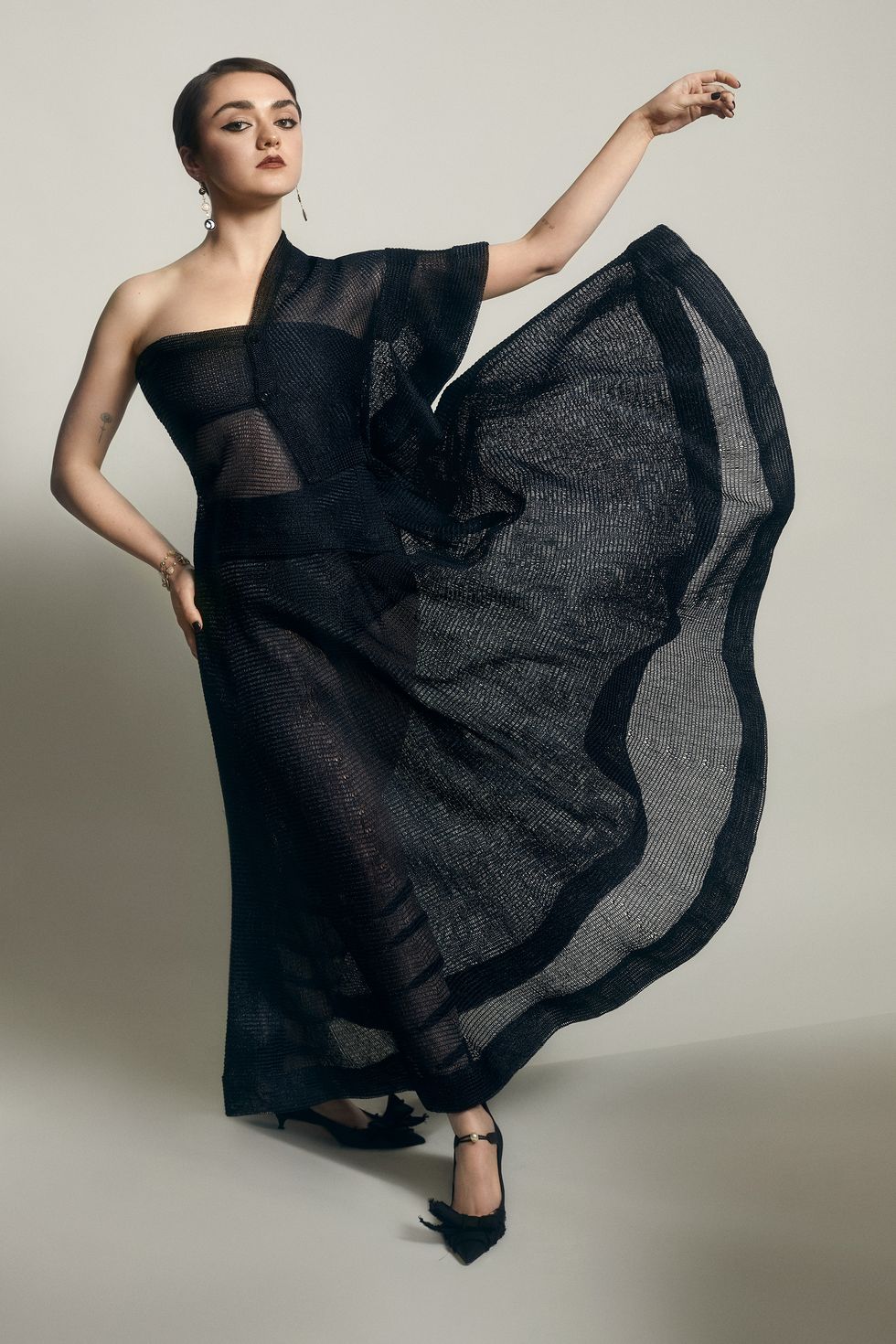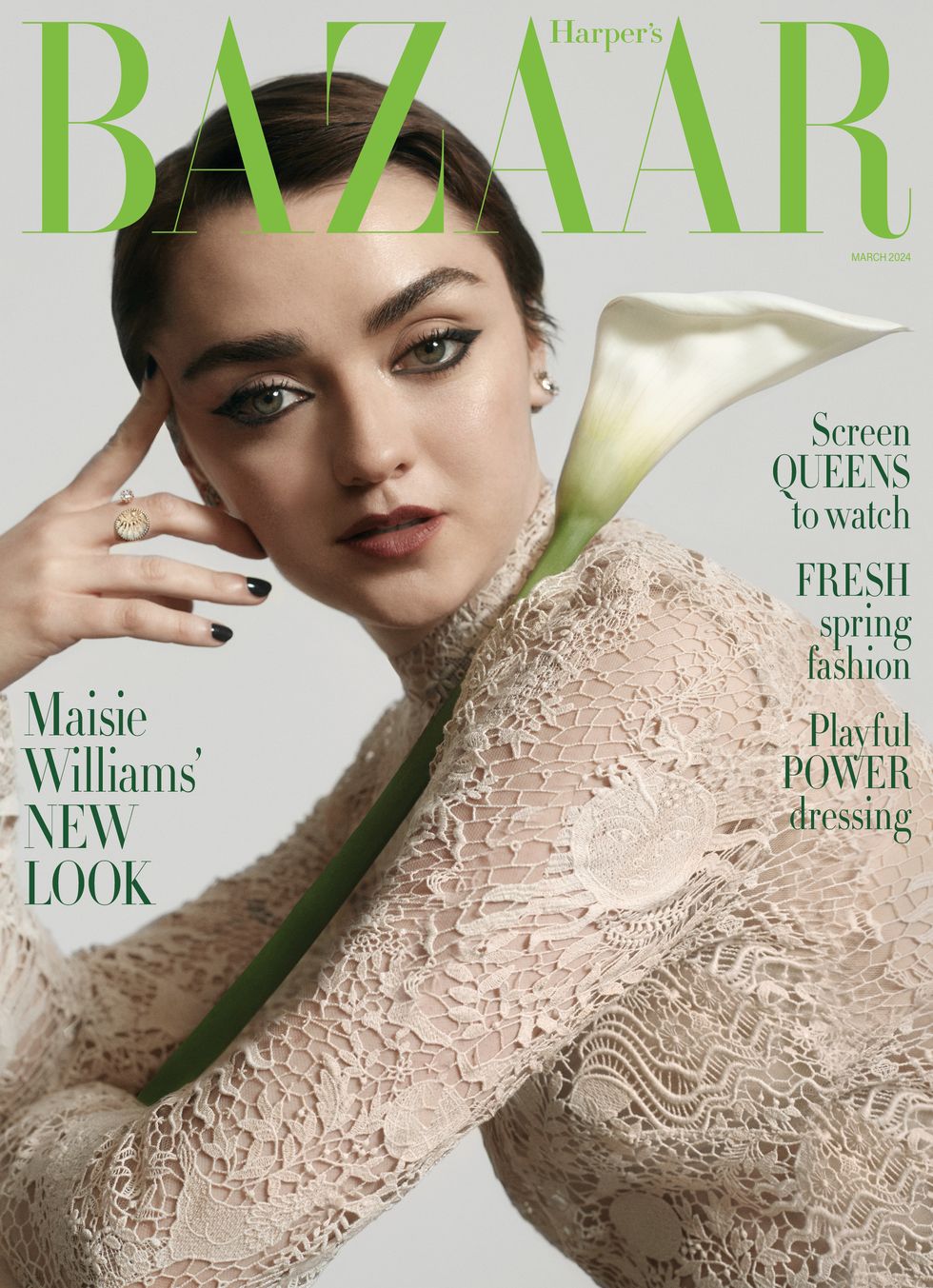When I arrive at the fashionable Mayfair restaurant where I am due to have lunch with Maisie Williams, I start worrying that she will be instantly recognised: the Twenty Two is filled with the chatter of a chic crowd, and there’s a throng at the entrance, too. Given her status as a global celebrity (thanks to her starring role as Arya Stark in the blockbuster television series Game of Thrones) it seems likely that she’ll attract attention. But Williams slips inside, unnoticed by anyone but me, disguised by a pair of plain, round-rimmed wire spectacles and an anonymous-looking black padded jacket over jeans. It is almost as if she has learnt the art of undercover espionage from the part she has inhabited for a year: Catherine Dior, a heroine of the French Resistance during World War II, portrayed by Williams in the forthcoming 10-part Apple TV+ series The New Look.
Williams’ character in the show is based on my book, Miss Dior, which explores the previously unknown story of Christian Dior’s beloved younger sister Catherine, who inspired his most famous perfume and shaped his creative vision in the aftermath of the Nazi occupation of Paris. Until now, Williams and I have never met; yet our shared absorption in this subject gives an unusual emotional intensity to our encounter today. “Thank you so much for doing this,” she says to me, as she sits down at the table. “I’m so excited to finally meet you. When I was filming the show, I listened to your voice every night for a year – reading the audio version of Miss Dior.”
She tells me that my book has been her constant companion – “it’s still beside my bed” – and that she feels as if she accompanied me on my lengthy journeys in search of Catherine Dior, from her childhood home in Normandy to Paris, and onwards to Germany, where she was imprisoned by the Nazis at Ravensbrück concentration camp. “I was seeing through your eyes, and discovering the way that you really had immersed yourself in Catherine’s world. And by reading your book, I cut myself off from the rest of the world.”
She won the role in February 2022 and it was filmed until the end of that year. “It was a long job, and it was amazing; my whole life moved to Paris. It was hard work, but it was such an honour to do this part, and it became all-consuming. This was a role that required an extraordinary amount of research and care – and it really hit me, bringing that wartime period back to the streets of Paris; like I could acknowledge the weight of it in a way that I hadn’t before.”
At 26, Williams is the same age as Catherine Dior when she was arrested and tortured by the Gestapo in July 1944. Catherine had joined the Resistance three years earlier, and risked her life on a daily basis as a key member of a covert network called F2, which gathered intelligence for the Allies. Williams chooses her words with care when she speaks, in a way that I imagine Catherine would have done; and like Catherine, she is thoughtful, giving the impression of being wise for her years. (Nina Gold, the casting director for Game of Thrones, described Williams as an “old soul” at the age of 12, when filming began on the series.) Those who were closest to Catherine recalled her direct, unflinching gaze that reflected her honesty, and told me that her quiet strength and resilience were untainted by vanity or arrogance. Although Williams is not an exact visual match for Catherine (who was her brother’s first model when they were living together in Paris in the 1930s), they share the same unwavering grey eyes, framed by dark brows, suggesting a compelling level of focus.
I wonder how she was able to cope with filming the most harrowing scenes in the series, which depict Catherine’s interrogation in Paris, followed by the hellish rail journey in sealed cattle trucks to Germany, and the ensuing savagery of the Ravensbrück concentration camp. “It was very relentless,” she says; “the process of doing take after take, it really breaks down your character in a way. It’s not for everyone, but for me, I like to get lost in a role, and keep on pushing until we complete a scene.”
Even when Williams is almost wordless on screen – and Catherine’s silence was integral to her courage, given that she refused to give the names of her comrades in the Resistance to the Gestapo, thereby saving their lives – her presence is powerful, and propels the narrative onwards. And the physicality of Williams’ performance is startling: her head was shaved, to mirror Catherine’s brutalising arrival at Ravensbrück, where the women underwent a dehumanising process that turned them into nameless numbers in the Nazi death camps. Williams also lost 12 kilograms, in order to realistically portray Catherine’s emaciated appearance when she returned to Paris at the end of the war, close to death, ravaged by pain and haunted by the suffering of the camps.
This regime was carefully overseen by medical professionals, with regular blood tests and measurements of her heart rate; yet it sounds gruelling. “I was eating very little, meditating all the time, burning candles and incense in my apartment.” Much of the weight loss, she says, came from sweating out fluid just before filming – in the same way that boxers and jockeys reach their target weights for the day of a fight or race. “I had to be up at 4am to start sweating. The night before, at about 7 or 8pm I was allowed to have something salty and dehydrating– some smoked salmon and a tiny glass of wine. Then I had a boiling-hot bath with lots of salts in it. And I sort of levitated to bed and slept for maybe three hours, and woke up and had a handful of nuts. I wouldn’t be able to sleep through the night at this point. I kept waking up and feeling like a marble inside a bottle, rattling around…”
Often, she says, during these uneasy, restless nights, she would plug in her earphones, to listen to my voice reading Miss Dior. She also walked on a treadmill while watching a film of the opening ceremony of the 2012 London Olympics, in an attempt to understand the patriotism that led Catherine to risk her life for the cause of freedom and independence. At first, she says, “I couldn’t really connect with what it feels to be so patriotic, because I’ve often felt disappointed and let down by the way that my own country has behaved. But I knew the times when I felt most proud were during the Olympics.” The endurance required of her was, she observes, far more demanding even than filming Game of Thrones, with its blood-drenched battle scenes. The role of Arya Stark, she says, involved “building different muscles”; but this part “took over what I’m eating and how I’m moving and sleeping and thinking…”
Aside from the insomnia, she found that Catherine Dior began to inhabit her dreams, much in the same way that I myself suffered from nightmares during the research for the book. “There was a lot of feeling restricted, almost like sleep paralysis, dreams of being trapped and attacked, and horrible visions of men in uniform.” At the same time, she adds, she understood the importance of maintaining her belief in the more positive aspects of the story. After all, Catherine Dior made a new life for herself as a rose-grower in Provence, drawing solace from the natural world, while her brother created a legacy of enduring beauty. “Every day of filming was a reminder that we were portraying a story of the horrors that humans are capable of inflicting on one another, but also the magic and the hope and the love… Ultimately, we wanted to make a show that was uplifting.”
The series is written and directed by Todd A Kessler, an American showrunner best known for The Sopranos and the TV thriller Damages, starring Glenn Close, who also appears in The New Look as Carmel Snow, the legendary editor of Harper’s Bazaar. In reality, Snow was an early champion of Christian Dior – even before the war, when a number of his illustrations appeared in Bazaar – and her importance in recognising and promoting his exceptional talent is given due credit in the series. Dior is played by Ben Mendelsohn – who made a name for himself in Kessler’s Netflix drama Bloodline – while John Malkovich is cast as the Parisian couturier Lucien Lelong, and Juliette Binoche as Coco Chanel. Williams more than holds her own among this stellar cast of award-winning actors; indeed, it is her performance that I find most convincing in the entire series (in which all the French characters deliver their lines in English, presumably with the US market in mind).
Like Catherine Dior, Williams is the youngest of five siblings, with a 17-year age gap between herself and her oldest brother; she has two other brothers and a sister. This background may explain why she can relate to the relationship between Catherine and Christian, and the designer’s protective, brotherly devotion to his sister, who was 12 years younger than him. Evidently, the emotional connection between Christian and Catherine resonated with the actors who played them: Mendelsohn has two younger brothers, and Williams explains that “our families were one of the first things that came up when we started talking”.
Born Margaret Constance Williams in Bristol in April 1997, she was nicknamed Maisie as a little girl, and grew up in the Somerset village of Clutton where she went to the local primary school. She has not experienced the death of a parent (Catherine Dior was 13 when her mother died), but her parents separated just a few months after her birth. “I don’t have a relationship with my dad,” she says. “And I guess there is a grieving for the death of something you might feel you’re entitled to…”
“The death of a relationship?” I suggest. “Yes, that’s true,” she replies, “though as much as possible, I try to empathise with the people I love.” She says that she remains close to her family (her mother is a former university administrator), but she is respectful about their right to privacy. Her rapid rise to fame in Game of Thrones – which coincided with her adolescence and teenage years – appears not to have caused the damage that is sometimes associated with child stardom. This seems all the more remarkable given that the series was her professional debut; she had no previous experience or training, other than local dance classes. And she has avoided the trap of turning her personal life into tabloid fodder: when she split up with her longstanding boyfriend, the fashion designer Reuben Selby, she posted a picture of them together on her Instagram account, with a gentle caption: “Since we met 5 years ago, our connection always extended deeply into our shared, and separate, creative careers… it will continue to do so.” Her own interest in fashion is genuine: she made a striking appearance wearing a Simone Rocha gown at the Fashion Awards in December, and recently teamed up with a sustainable clothing brand to design a coat (with all profits being donated to a Bristol-based charity that supports young people in need). Unsurprisingly, she describes herself as “a huge admirer of the Dior house”. One of the highlights of her role in The New Look, she says, was the opportunity to visit the maison’s archives in Paris, where she was shown Catherine’s medals for wartime bravery, as well as an array of exquisite couture gowns from Dior’s early collections.
Yet despite her pleasure at the prospect of seeing this year’s Dior fashion shows in Paris, Williams also seems to cherish her time at home, in her own house and garden in the Sussex countryside. She takes out her phone to show me pictures of the flowers she planted last summer – pots of cosmos, pelargoniums, dahlias, and roses. “I love being alone there,” she says, “to breathe and walk in the silence.” Catherine Dior would certainly have approved.
‘The New Look’ launches on Apple TV+ on 14 February. ‘Miss Dior: A Wartime Story of Courage and Couture’ by Justine Picardie (£20, Faber & Faber) is out now.
Hair: Ben Talbott at the Wall Group
Make-up: Bari Khaliqueat the Wall Group, using Dior Beauty
Manicure: Michelle Humphrey at LMC World
Stylist’s assistants: Crystalle Cox and Jess Miller
Photographed at Raffles London at the OWO


